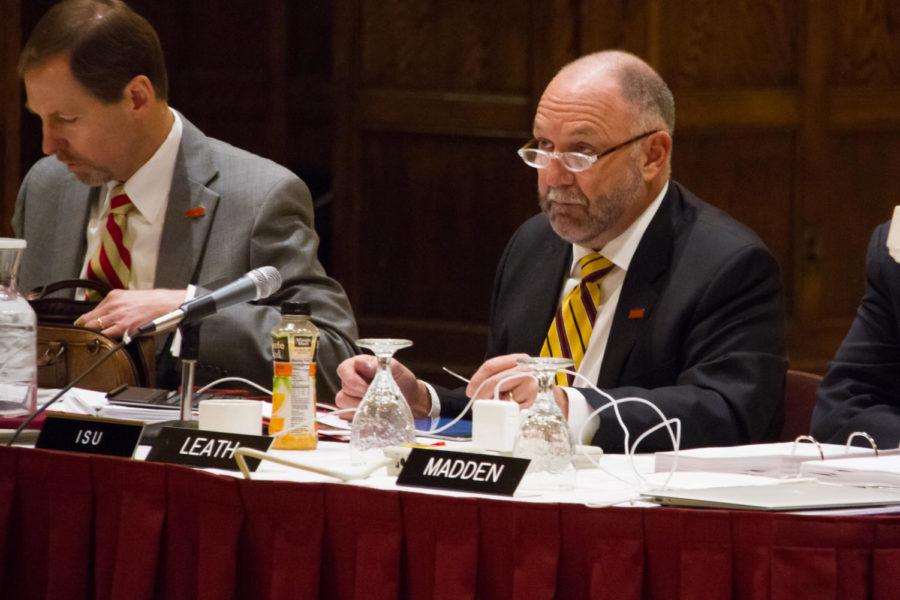Board of Regents discuss new lease agreements
Iowa State University President Steven Leath listens to a result of an audit during a Iowa Board of Regents meeting in the Great Hall of the MU on Feb 25.
April 20, 2016
The Board of Regents met Wednesday, the first of a two-day session, to discuss several changes to academic departments, the approval of tenure recommendations and the approval of future leasing projects.
Board approval was needed for the approval of tenure and promotion recommendations for the 2016-2017 academic year.
The University of Iowa proposed 134 total promotions, while Iowa State proposed 58 and the University of Northern Iowa recommended 28. The 2015-2016 year witnessed a 1.9 percent increase in faculty numbers among the three universities, totaling 5,905. The amount of tenured faculty decreased by 1.3 percent.
The ISU Property and Facilities Committee requested the approval of several leasing projects to be completed within the next several years.
The projects included a new indoor practice facility for the ISU women’s tennis program. A local church recently bought out the current indoor facility, which can no longer be used by the team.
“This will be a relatively simple facility with two courts inside but no offices or other facilities,” said Warren Madden, senior vice president for business and finance. “The basketball practice facility location has worked well for basketball players due to CyRide being so close. The location should benefit the team.”
Consisting of a 16,000-square foot facility and costing $540,000 a year in rental rates, the location would be directly south of the Sukup Basketball Complex. Being so close to the existing complex benefits Iowa State in shared parking and custodial services.
Easements involving the Dakota Access crude oil pipeline were also proposed for approval by the committee.
Spanning more than 34 acres of ISU land, a major concern for the project was the destruction of tile systems and agricultural land. However, Dakota Access has completed agreements with Iowa State and local research lands to restore any damage to sewage systems, soil or conservation efforts.
Iowa State is pushing for approval so the project can be completed within one full growing season.
Iowa State, Northern Iowa and Iowa discussed several changes to established academic programs, including name changes and the elimination of some.
ISU Provost Jonathan Wickert began by proposing a name change to the Bachelor of Design Program.
The proposal, which is 5 years old and has a base of about 85 students, aims to change the name to the Bachelor of Arts Program in Interdisciplinary Design in the College of Design.
The switch comes on behalf of a 2012 peer review of the program, in which the National Association of Schools of Art and Design (NASAD) accreditation system requested the name be changed to better suite the curriculum found within the program. In order for Iowa State to keep in accreditation from the NASAD for the remaining art and design programs, a name change was proposed.
The Bachelor of Design Program will receive its new title in the fall semester.
Other changes included the future merging of the department of anthropology and department of world languages and culture.
Elimination of the department of anthropology would be completed by the 2016 fall semester but would not drop any faculty or programs.
The change aims to provide more efficiency for students and faculty members.
“The current department is too small to function as a stand-alone unit and will be more efficient as it there won’t be separate admission, committees, faculty, etc.,” Wickert said. “Usually mergers are very contested, but the departments are excited about the new synergy created from the change.”
Finally, among the several internal audits performed on Northern and Iowa, Iowa State received only one audit on the department of statistics. Receiving a moderate on the CEA assessment, recommendations for the program included improved sensitive data storage and properly controlled internal door access.

















